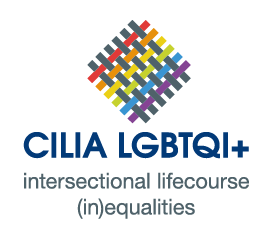CILIA LGBTQI+ LIVES Comparing Intersectional Lifecourse Inequalities amongst LGBTQI+ Citizens in Four European Countries. Read our Executive Summary
Bayrakdar S and King A. LGBT discrimination, harassment and violence in Germany, Portugal and the UK: A quantitative comparative approach. Available here
This article examines the incidents of discrimination, harassment and violence experienced by lesbian, gay, bisexual and trans (LGBT) individuals in Germany, Portugal and the UK. Using a large cross-national survey and adopting an intra-categorical intersectional approach, it documents how the likelihood of experiencing discrimination, harassment and violence changes within LGBT communities across three national contexts. Moreover, it explores how individual characteristics are associated with the likelihood of experiencing such incidents. The results show that trans people are more at risk compared to cisgender gay, lesbian and bisexual individuals to experience discrimination, harassment and violence. However, other factors, such as socioeconomic resources, also affect the likelihood of individuals experiencing such incidents. The three countries in our study show some nuanced differences in likelihood levels of experiencing discrimination, harassment and violence with regard to differential categories of sexual orientation and gender identity.
Hall, M., Barbrook-Johnson, P., Bayrakdar, S. and King, A Queer(y)ing Agent-Based Modelling: An example from LGBTQ workplace studies. Available here
This paper explores the ways in which Agent Based Modelling (ABM) can contribute to the study of LGBTQ lives, and conversely, how theory and insights from LGBTQ studies can inform the practice of ABM. In doing so, it introduces an example model of LGBTQ workplace inequality to illustrate several uses and challenges associated with research in this area.
Bayrakdar S and King A. Job Satisfaction and Sexual Orientation in Britain. Work, Employment and Society 0(0): 0950017020980997. Available online here
Studies looking at patterns of labour market outcomes among lesbian, gay and bisexual (LGB) individuals focus mostly on earnings, while non-pecuniary outcomes of LGB individuals have remained a relatively under-researched area. Using the latest wave of the Workplace Employment Relations Study (WERS), this article investigates the job satisfaction levels of LGB individuals compared to their heterosexual peers for the first time in Britain. The results show significantly lower job satisfaction levels only for bisexual men, compared to their heterosexual counterparts. Moreover, the findings do not show a direct impact of LGB(T)-related workplace policies on job satisfaction levels.
DIAL Policy Brief No. 1 ‘Toward a gender-equal Europe: What can policymakers learn from the Dynamics of Inequality Across the Life-course (DIAL) research?’ Available online here
There are a number of key European policy agendas related to gender equality on which the DIAL research can shed light. This policy brief gives an overview of early findings from DIAL projects in this area. Key Findings:
- Family policies are linked to differences in earnings and wealth in mid-life across Europe.
- Investments in skills and training for older women could be promoted to help close gender pay differentials.
- Women face a greater risk of poverty throughout their working lives and into retirement because of breaks in paid employment and reduced work hours which have led to systematic disadvantage.
- Claims that life has got better for LGBTQI+ people do not always hold up to scrutiny nor match the lived experiences of individuals.
We’re really pleased to bring you our newsletter for Autumn/Winter 2020. In this newsletter we outline what we’ve been doing on the project for the past eighteen months, the new data we’ve collected, the presentations we’ve made and the publications we’ve produced. You can also read about our plans as we head into the final year of the project.

